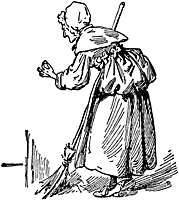 |
| "Oh, it's my ancestry back to Eve!" |
Why? I'd like to proffer an example of a recent exchange I had with a researcher who contacted me regarding information I have on an Ancestry tree. In this instance, note carefully the use of the word "research" by the person who wrote to me:
In this case, a woman wrote to me to notify me that some of my dates and locations for a man in my family tree were wrong. I had been researching this man for a little over five years, concentrating in this time on his life in the United States after his immigration. This woman speculated that my information was inaccurate, due to what her "research" had revealed.
Her "research," as it turned out, consisted of a naturalization index card she had found on Ancestry, as well as family information she had found on various family trees online (all of which, I would note, are iterations of my own research into this hitherto un-digitized family).
My information was faulty, she said, because unlike my family tree information which said that this man had arrived in the United States from his birthplace of Milan in 1839, the naturalization index card that she had found on Ancestry showed that he had arrived in 1848 and was from Austria. My dates, she said, seemed "wrong."
Now, in this case, the extent of "research" that had led this woman to seek to clarify/correct my own research was, it seemed, a piece of indexed information that she had found on Ancestry. I was happy to send along a scan of the gentleman's entire naturalization file which I had received from the East Baton Rouge Clerk of Court's office. The file showed that the man in question had, indeed, arrived in 1839, although his declaration of intent was filed in 1848--this date was used on the naturalization card as the man's date of arrival in the United States.
I was also happy to point out to this researcher that the naturalization card was somewhat misleading in suggesting that the man was from Austria; in fact, as per the naturalization file, when he became a US citizen, he swore to revoke any and all allegiance to The Emperor of Austria, who, at the time of the man's naturalization in 1854, ruled over Milan as part of the Austrian empire.
Now, I concede that the naturalization card was somewhat misleading (and a good lesson as to how indexes can lead us to reach improper conclusions in our research). I also applaud her natural tendency to question the information she saw in my tree (I do, I'm sure, have some mistakes in there), but I also question this person's quickness to "correct" without having performed a modicum of true research on her own.
The key word here is "research." To my mind, calling this woman's work "research" is an abuse of the word, if only because what she had done was only half of the process deserving of that word. "Performing a search," "taking an overview of available information," or even "surveying previous research" is, of course, part of the research process. But locating an online family tree and preparing to undermine that research based on research that hasn't even been performed seems overeager at best, a slippery slope toward shoddy research at worst.
I'm happy (sarcastically) to report that the 15-page Genealogy Report regarding this matter that I sent this researcher has now been faithfully transcribed by her into her family tree, without attribution or documentation as to where she obtained the initial research. Of course, seeing as how I emailed her five years worth of research (along with scans) intending to bring her up to speed, and she never took the time to write and thank me for taking time to do so.... well, the move to proudly display my work as her own doesn't surprise me much.
It is, apparently, all part of her diligent "research."


